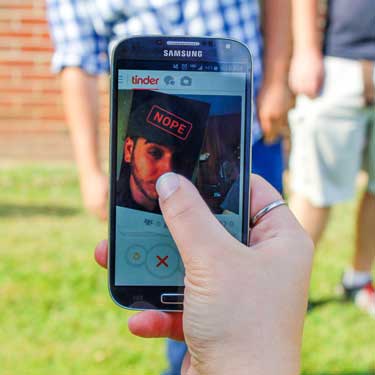Story by Kayla Harrell, Contributing writer

Tinder allows people to find other singles in their area with just the right swipe of a finger.
Ryan Mahoney, Murray State sophomore from Owensboro, Kentucky, started using Tinder when the app came out two years ago.
Mahoney began swiping right on his preferred individuals, the matches popped up and conversations between two strangers began.
“The Internet is like a mask,” Mahoney said. “You can hide your true self.”
Using a dating site, like meeting a potential significant other at a social event, comes with risks. The risks can range from unforeseen vulnerability to stalking.
“It’s much easier for people with questionable motives to become available on those services,” said Sean Rife, assistant psychology professor.
Jana Hackathorn, assistant professor of psychology at Murray State said Tinder tends to be a dating site with an emphasis on physical attraction. The first thing a user sees is a picture of a potential match.
Rife said the purpose of Tinder is not about finding the right person for students, but more about increasing the self-esteem of an individual. There’s a component to Tinder that gives the user a sense of instant gratification. Students feel this sense when they receive a match because people found them attractive. However, this attraction is usually superficial.
“Studies show that people don’t know who they are attracted to,” Hackathorn said. “They have these things in their heads that they think they find attractive, but actually that’s not always what they actually find to be attractive.”
Even with the negative, there are still positives to using a dating site.
“There are a lot of people whose mental health issues include anxiety,” said Angie Trzepacz, director of Murray State counseling services and psychologist.
“The dating sites are a good resource for them because they are too anxious to go out and meet people in person,” Trzepacz said. “It’s easier for them to do it online.”
Students talk about the dating sites, but few admit to using one. Many are embarrassed that they use one of these sites and believe they are less capable of finding a significant other.
“Admitting that you need the site bothers people because it somehow says that you’re meaningless, you’re worthless and that you can’t easily find another person,” Hackathorn said.
However, a 2013 study by the Pew Research Center shows Americans are becoming more accepting of using dating websites.
According to the study, 21 percent of people said they agree with the statement, “People who use online dating sites are desperate.” This statistic was down eight percent from another study conducted in 2005.
If a student uses one of these dating sites and experiences negative effects, Hackathorn recommends seeking help in the Psychological Center on the fourth floor of Wells Hall.
“I would emphasize the importance of social support,” Rife said. “If a student has had some negative interactions on these services, certainly having a good network of friends and supportive family members is an important component.”
When a student decides to use one of these sites, precautions need to be taken, Trzepacz said. Both Rife and Hackathorn advise finding a site that focuses on the interests and preferences of that individual.
“Take things slowly. Be really careful. Have other people read the profile of a match to see if there is something that you missed,” Trzepacz said.
Mahoney still uses Tinder to connect with people but has developed boundaries for the individuals he meets through the app.
“I do not trust people as often as I used to,” Mahoney said. “With the sites, no one tells their true self, especially if they don’t like something about themselves.”




























































































